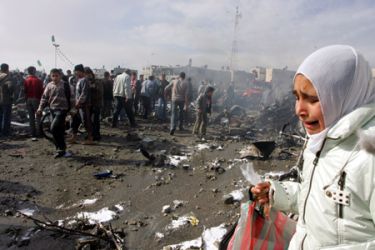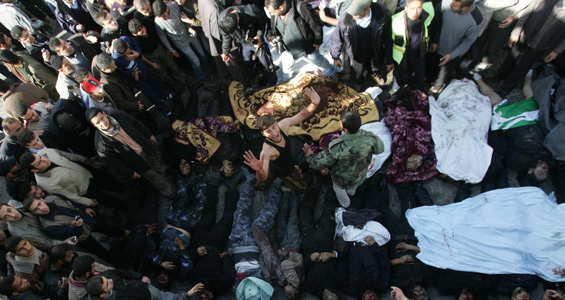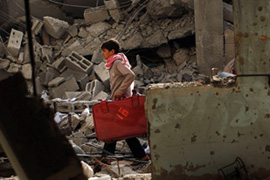December 27: 96 widows, 245 orphans
For each day of the war on Gaza, we visit one family living with its repercussions.

 |
| On the first day of Israel’s war on Gaza, 130 policemen were killed [GALLO/GETTY] |
For each day of Israel’s war on Gaza, the Al Mezan Center for Human Rights, reports on how one family is coping with the war’s aftermath.
In its first report, Al Mezan talks to the family of a policeman killed on the first day of the war.
Israel launched Operation Cast Lead on December 27, 2008, with a surprise air attack which targeted dozens of civilian installations across the Gaza Strip; 24 civil police stations were among the targets.
In these first few minutes, 130 policemen were killed; leaving 96 women widowed and 245 children orphaned.
Fayiz Al Madhoun, 33, was killed in an attack on the Az-Zahra City police station.
A year after his death, Al Mezan Center for Human Rights in Gaza interviewed his mother, Um Fayiz, and his widow, Ra’ida.
Joining the police force
“Fayiz joined the police in 2006,” Ra’ida explains. “We’d been living with our in-laws before then, but when he got a job we were able to buy a piece of land so we could build our own house.
| in depth | |
|
“Fayiz really liked organised things. He had heard that the police would be organised, and that it would be fair; that there wouldn’t be favouritism and nepotism in the appointments.
“He was out on street patrols for two years, but then he was injured in one of the Israeli incursions. He was hit by shrapnel and lost his sight in one eye.”
Um Fayiz continues: “He really wanted to stay in the police force. He didn’t want to lose his job and they found him work in the kitchens. He could cook quite well. But he couldn’t make rice at first, we had to help him. He got it in the end.”
The day of the attacks
“That morning, when he left for work, he cut down some branches from a tree outside the front door,” Ra’ida recalls.
“He said he was going to make a lattice for the plants to grow up on when he got back. He said we would do it together. That was the last thing he said to me. I hate that tree now. I feel like it’s a bad omen.”
Um Fayiz was the first to hear the news.
“Fayiz’s brother Ismail heard about the attacks that morning and went to the hospital to give blood. He found Fayiz’s body among the dead.
“He came to me straight away. I started screaming and shouting, ‘What are you saying! What are you saying!’ He was my first born and eldest child. I couldn’t believe he’d been killed.”
The children must cope
“I have four children. Riyad, who is 10, Mohammed, 8, Ahmed, 7, and Mai, 2,” Ra’ida says.
“Mai was so young when he died. She didn’t understand. She would tell people who came round that her daddy was visiting his mum. She kept telling people to bring her daddy back home.
“Fayiz used to take the children to visit his grandfathers’ grave, so they could read the Quran to their great grandfather. They buried Fayiz in the same grave and I tried to explain to the children that their father is now there. The children didn’t believe me. They kept saying, ‘No, my great grandfather is here, not my father’. Only Riyad understood.
“All of the children have become a lot clingier now. They don’t want to be alone. Ahmed keeps saying to me, ‘Mum, if you die, what family will I have? Where will we go?’
“Riyad has changed the most though. He has become more grown up. Maybe he feels like he has to be responsible now as he is the eldest. He used to be afraid of the dark, but now he is much braver than before.
“Mohammed’s school counsellor said he has become very alone. He’s stopped playing with his friends. Ahmed has started fighting with his classmates. He used to fight before, but not as much as now. I worry about them so much.”
Widowed in Gaza
Ra’ida is one of over 300 women widowed as a result of Israeli attacks during Operation Cast Lead.
 |
| On the first day of the war, 245 children were orphaned [GALLO/GETTY] |
With women having even fewer employment opportunities than men in the impoverished Gaza Strip, these women, now the main breadwinners for their families, have been driven into even deeper poverty.
“Life without him is hard. I have had to take responsibility for everything; for all the finances; for finishing building the house. I didn’t realise how expensive life is before he died. I’ve borrowed money from my father and I’m trying to finish the house myself. I used to hassle Fayiz to finish it; I didn’t realise how expensive it is. I wished I’d understood before he died.”
With the support of her mother-in-law Ra’ida has been able to stay in her marital home. In socially conservative Gaza, divorced and widowed women often come under pressure to move back to their parent’s home.
“It’s her home,” Um Fayiz says. “She should stay here. I spend a lot of time here with her and the children; I usually stay over and I go to the shops with her because it’s hard for her to go out by herself. People talk about widowed women here. They start rumours about why she is going out alone.”
Prospects for justice
The government of Israel has illegally classified Gaza’s policemen as combatants, claiming that they form part of the Hamas military infrastructure.
This claim is inconsistent with the requirements of international humanitarian law.
The UN fact-finding mission confirmed that the Gaza police is a civilian law-enforcement agency; its members are thus civilians, entitled to full protection under the Fourth Geneva Convention.
In deliberately targeting these civilians, Israel committed a war crime.
Ra’ida’s experiences have left her with little hope.
She says: “Every time they invade Gaza they send human rights people to conduct investigations. They say that Israel has committed war crimes. But nothing happens. They just come back and do it again.”
